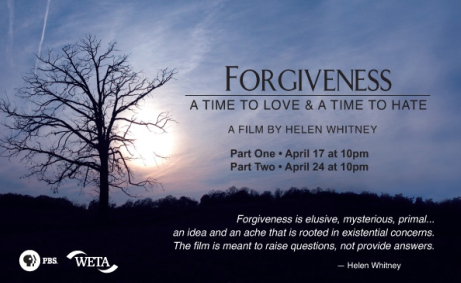
Rebecca Wexler works with Oscar-nominated documentary director.
A Gates alumna has associate produced a US documentary on the theme of forgiveness with an Oscar-nominated director.
Rebecca Wexler [2005] associate produced the PBS film “Forgiveness: A Time to Love & a Time to Hate”, a film about forgiveness and transitional justice. It is directed by Oscar-nominated Helen Whitney and was broadcast nationwide on April 17th, and will be repeated on Easter Sunday, April 24th, at 10PM.
The documentary covers Katherine Ann Powers, an anti-Vietnam radical who turned herself into the FBI and the Rwandan Gacaca courts, as well as many others. The film will also be streaming on the PBS website following the broadcast.
Rebecca says that as associate producer she did a range of things from reporting, story development, and cinematography to financial and legal arrangements, but her main responsibility was imagery. “Approximately 70% of our screen time consists of found images that I collected from diverse sources around the world in order to develop the visual narrative that accompanies the verbal storyline,” she says.
She was recommended to Helen Whitney by Michael Epstein who she worked with as a research on his PBS American Experience documentary about Grand Central Terminal.
She says the story in the documentary which left the greatest impression on her was the Gacaca courts in Rwanda. “In this post-conflict context of national reconciliation, the language of forgiveness is at once powerful and dangerous,” she says. “The prominence of forgiveness ideology in Rwanda today is evidence of its potential to provide a path forward after even the most extreme human tragedies. However, a darker side of coerced forgiveness also exists in Rwanda, where State and social pressure on survivors to forgive may actually work against national stability, and leave some individuals vulnerable to ongoing violence.”
Rebecca began making films while studying the history and philosophy of science at Harvard and continued to make films as a Gates scholar at Cambridge where she says the emphasis was on using filmmaking to challenge assumptions about scientific knowledge and its representation. She says: “I realised that documentary filmmaking is an opportunity to add complexity and ambiguity to national broadcast media in order to empower mass audiences to challenge assumptions in public culture.”
The Gates-Cambridge Trust and the Cambridge Department of History and Philosophy of Science supported her in producing a short documentary film about a science laboratory as part of the degree requirements for her MPhil and she says her time at Cambridge continues to inspire her in her approach to filmmaking.
After leaving Cambridge, where she did an MPhil in the history and philosophy of science and medicine, she went straight into documentary filmmaking, beginning as an Intern on a film by Alex Gibney called “Taxi to the Dark Side.” It was about torture in the War on Terror, and it went on to win an Academy Award.
She says working on “Forgiveness” has been one of the most challenging of her filmmaking experiences so far. “The stories in “Forgiveness” range from the intimate personal struggles of a single human being to reconciliation between nations following mass atrocities. Distilling these stories down to the lasting and provocative questions embedded inside of them has been a deeply collaborative and inspiring process,” she says.
Rebecca is currently a Fellow at the Yale University Law School Information Society Project where she is teaching documentary filmmaking and visual advocacy to law students through the Yale Visual Law Project. She is also completing a film for the Yale University Art Gallery about the revival of a criminalised religious dance practice, called D’mba, from Guinea, West Africa. After that, she will travel to Sri Lanka on a Core Scholars Fulbright Grant to conduct research with the Tulana Media Unit, an organisation that provides documentary film training to underprivileged communities throughout Sri Lanka.












